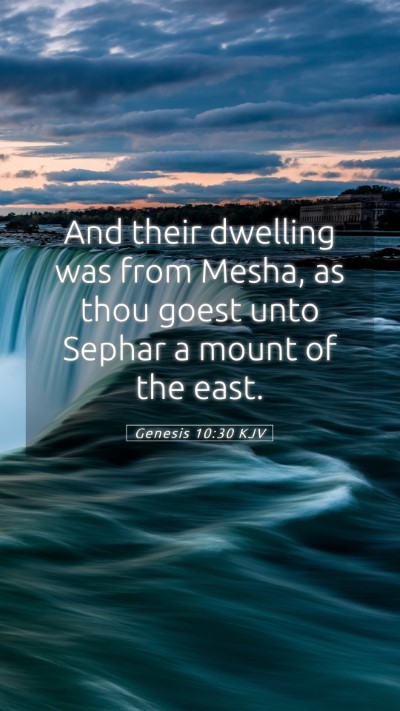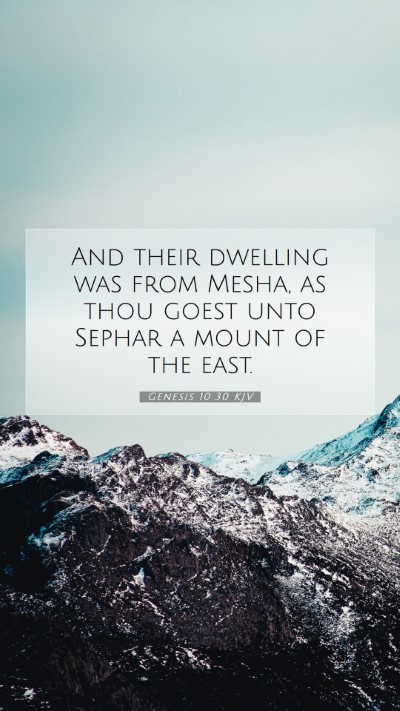Bible Verse Meaning: Genesis 10:30
Verse: "And their dwelling was from Mesha, as thou goest unto Sephar a mount of the east." (Genesis 10:30)
This verse is nestled within the genealogical context of Genesis chapter 10, often referred to as the Table of Nations. The verse specifically details the territories inhabited by the descendants of Joktan, one of the sons of Eber.
Understanding the Context
Historical Significance: The listing of these descendants and their lands serves to trace the origins of various nations that branch out from the family of Noah following the flood. Genesis 10 provides an essential backdrop for understanding the diversity of peoples and cultures that arose post-diluvian.
Genesis 10:30 illustrates a geographical significance:
- Mesha: Identified with regions in what is now northwestern Arabia.
- Sephar: Thought to be a mountain region, possibly correlating to the area near modern-day Saudi Arabia.
Commentary Summaries
Matthew Henry’s Commentary
Matthew Henry notes that the geographical description emphasizes the expanse and variety within Joktan's descendants. It underscores how the population spread across the face of the earth, fulfilling the divine directive to repopulate after the flood (Genesis 9:1).
Albert Barnes’ Notes
Albert Barnes reflects upon the significance of the specific locales mentioned. He explains that these names provide insights into the migratory patterns of ancient peoples and offer a glimpse into the historical geography of the region. The mention of specific mountains hints at an understanding of trade routes and cultural exchanges throughout the ancient world.
Adam Clarke’s Commentary
Adam Clarke focuses on the descendants of Joktan, emphasizing their role in the lineage of nations. He elaborates on the relationship between these tribes and the eventual peoples that descended from them. Clarke also notes the note-worthy mention of these locations facilitates a greater comprehension of biblical geography that can enhance the study of Scripture.
Key Themes and Insights
- Divine Plan: The expanse of Joktan's descendants illustrates the fulfillment of God's promise to Noah regarding the spread of humanity.
- Migration and Settlement: This verse details early human migration patterns that are fundamental in understanding not just biblical history but also the broader implications for archaeological and anthropological studies.
- Cultural Development: Each area mentioned contributed uniquely to the rise of different cultures, providing a foundation for the nations that followed.
- Importance of Geography in Scripture: Understanding the geographical locations mentioned in the Bible can give deeper meaning to the events and narratives that take place throughout the biblical text.
Bible Study Insights
Application of Biblical Exegesis: For those involved in Bible studies or online Bible study groups, this verse can serve as a launching point for discussions about historical context. Understanding where these people settled can shed light on the socio-political dynamics of those times and how they relate to later biblical narratives.
Cross References
Relevant Bible Cross References:
- Genesis 10:1-5 — The genealogy of Noah's sons.
- Genesis 9:1 — God's command to Noah to be fruitful and multiply.
- Acts 17:26 — Paul speaks of all nations coming from one blood.
Conclusion
Genesis 10:30 serves as a vital intersection of geographical, genealogical, and historical discussions within Scripture. The verse illuminates not only where Joktan’s descendants settled but also reinforces the broader biblical themes of population dispersal and the fulfillment of divine purposes throughout history. Understanding such verses allows for richer insights into the biblical narrative and enhances our Bible verse interpretations.


